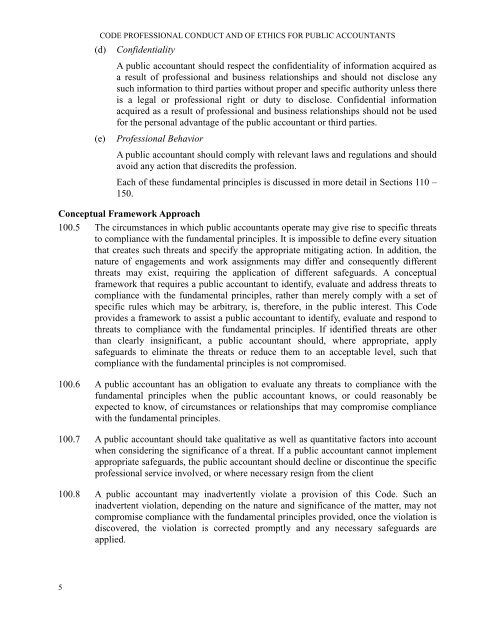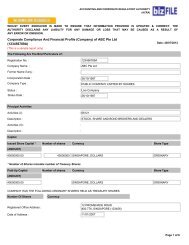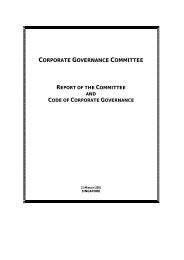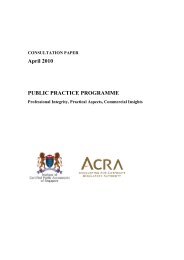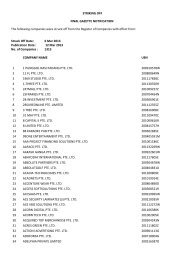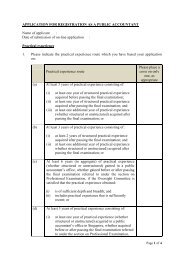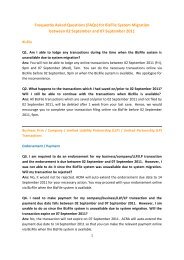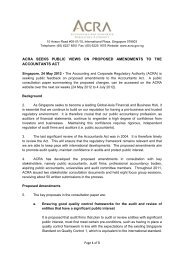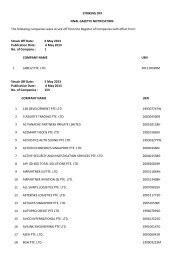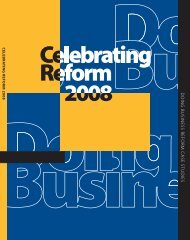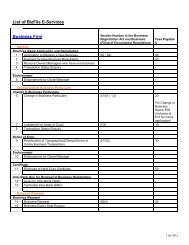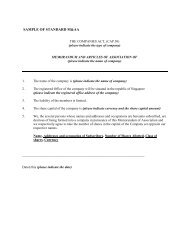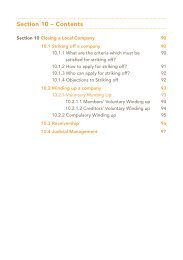Exposure Draft - ACRA
Exposure Draft - ACRA
Exposure Draft - ACRA
You also want an ePaper? Increase the reach of your titles
YUMPU automatically turns print PDFs into web optimized ePapers that Google loves.
CODE PROFESSIONAL CONDUCT AND OF ETHICS FOR PUBLIC ACCOUNTANTS<br />
(d)<br />
(e)<br />
Confidentiality<br />
A public accountant should respect the confidentiality of information acquired as<br />
a result of professional and business relationships and should not disclose any<br />
such information to third parties without proper and specific authority unless there<br />
is a legal or professional right or duty to disclose. Confidential information<br />
acquired as a result of professional and business relationships should not be used<br />
for the personal advantage of the public accountant or third parties.<br />
Professional Behavior<br />
A public accountant should comply with relevant laws and regulations and should<br />
avoid any action that discredits the profession.<br />
Each of these fundamental principles is discussed in more detail in Sections 110 –<br />
150.<br />
Conceptual Framework Approach<br />
100.5 The circumstances in which public accountants operate may give rise to specific threats<br />
to compliance with the fundamental principles. It is impossible to define every situation<br />
that creates such threats and specify the appropriate mitigating action. In addition, the<br />
nature of engagements and work assignments may differ and consequently different<br />
threats may exist, requiring the application of different safeguards. A conceptual<br />
framework that requires a public accountant to identify, evaluate and address threats to<br />
compliance with the fundamental principles, rather than merely comply with a set of<br />
specific rules which may be arbitrary, is, therefore, in the public interest. This Code<br />
provides a framework to assist a public accountant to identify, evaluate and respond to<br />
threats to compliance with the fundamental principles. If identified threats are other<br />
than clearly insignificant, a public accountant should, where appropriate, apply<br />
safeguards to eliminate the threats or reduce them to an acceptable level, such that<br />
compliance with the fundamental principles is not compromised.<br />
100.6 A public accountant has an obligation to evaluate any threats to compliance with the<br />
fundamental principles when the public accountant knows, or could reasonably be<br />
expected to know, of circumstances or relationships that may compromise compliance<br />
with the fundamental principles.<br />
100.7 A public accountant should take qualitative as well as quantitative factors into account<br />
when considering the significance of a threat. If a public accountant cannot implement<br />
appropriate safeguards, the public accountant should decline or discontinue the specific<br />
professional service involved, or where necessary resign from the client<br />
100.8 A public accountant may inadvertently violate a provision of this Code. Such an<br />
inadvertent violation, depending on the nature and significance of the matter, may not<br />
compromise compliance with the fundamental principles provided, once the violation is<br />
discovered, the violation is corrected promptly and any necessary safeguards are<br />
applied.<br />
5


